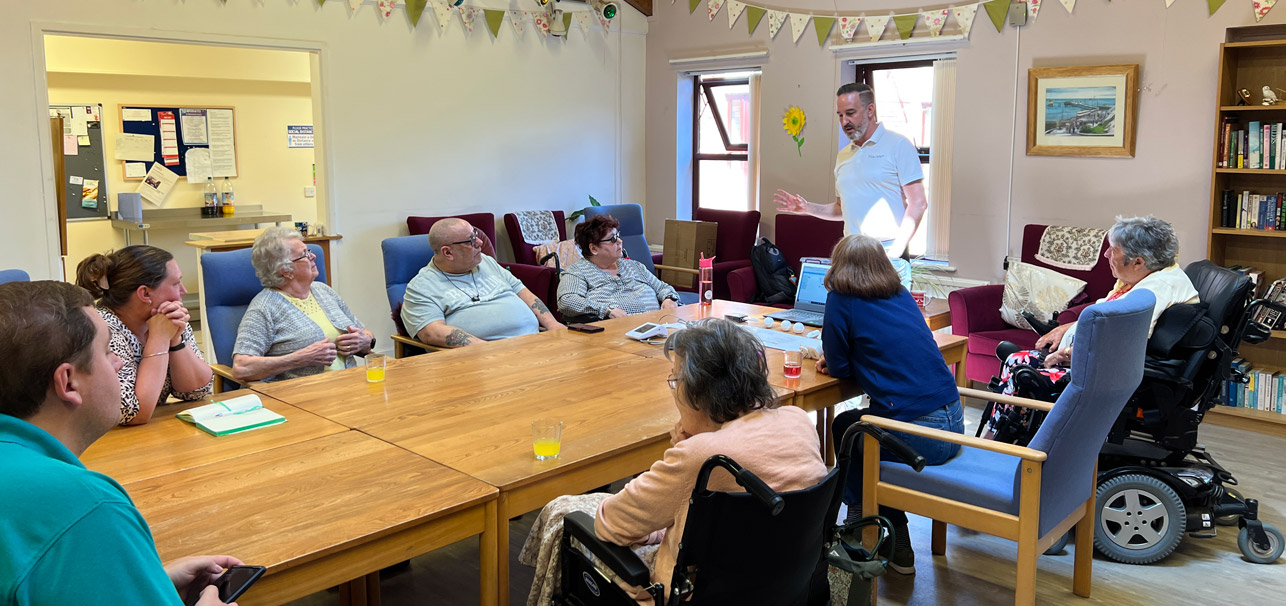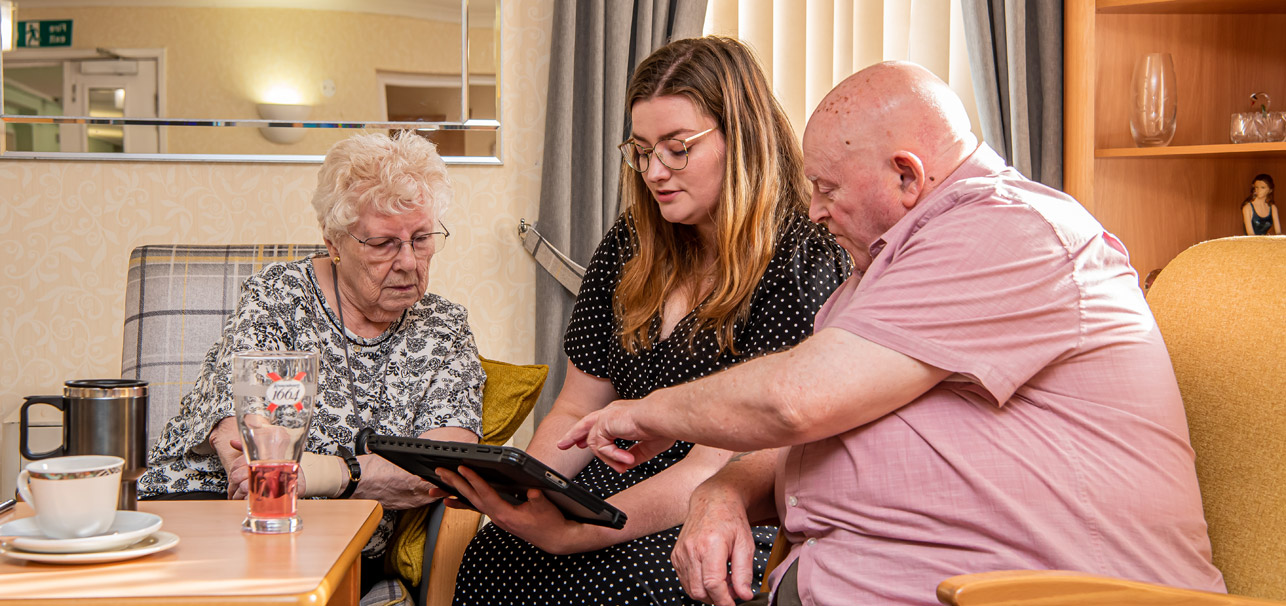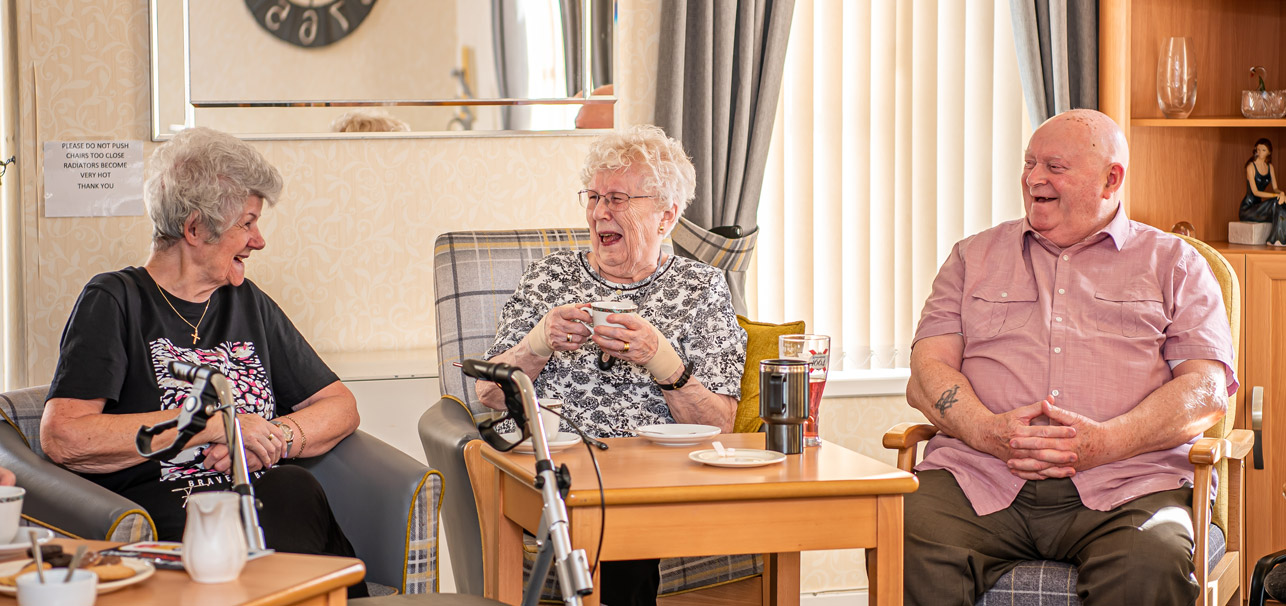How to run a co-production group around digital technology in later life housing
Any meaningful co-production will involve meeting as a group in order to discuss issues, make, and act on decisions.
This resource provides some advice on how to set up and run a co-production group around assistive technology and later life housing.
What are co-production groups set out to do?
There are many ways to run a co-production group. However, all groups do have some common things that they need to achieve:
- To provide a safe space where professionals and tenants can meet as equals
- To share information and views
- To make decisions
- To monitor progress
When to set up a group
Co-production is an essential part of designing an effective technology service which meets people’s needs and is effective in the long-run. Engaging tenants after key decisions have already been made can reduce tenants’ sense of ownership over the project, and can prevent this from happening. The co-production process should therefore, start as early as possible, prior to deciding on technologies, to ensure that people have a say on their services from the outset.
Coproduction is an essential part of designing an effective technology service which meets people’s needs and is effective in the long-run. Engaging tenants after key decisions have already been made can reduce tenants’ sense of ownership over the project, and can prevent this from happening. The coproduction process should therefore, start as early as possible, prior to deciding on technologies, to ensure that people have a say on their services from the outset.
Getting started
Recruitment
The first task is to recruit the participants. This is one of the hardest parts of the co-production process. But obviously its essential as without people to co-produce with co-production can’t happen.
For a well functioning group from three or four and up to 12 people works well. If you have over 12 people coming along, you might want to spend some of the meeting in smaller sub-groups. This will support quieter or less confident people to participate more fully. You should aim to make the group as representative as possible of the tenants. Including in terms of race, disability, gender, and sexuality.
Think about the balance of participants for your group. You may feel that it should be all tenants, or you might think that it would be helpful to have a mixture of staff and tenants. If you decide the group will be tenants only, then you need to think about how to ensure the input of staff is covered. One way of doing this is to invite staff as guests to specific meetings or to come along for part of each meeting.
It is important to make sure that the group includes in some way everyone who will play a role in the process of introducing technology into the later life housing development. For example, it might be helpful to include some frontline workers, a site manager, or an IT lead. If you involve people in the co-production process, they are more likely to feel ownership over it and will help the group overcome any barriers you may encounter.
For a co-production group there should be more tenants than staff. This helps to equalise the power imbalance between staff and tenants.
There are various ways to recruit tenants. These include putting up posters, writing a letter or email to all residents, knocking on people’s doors and having a chat, running coffee mornings or other events to talk about the group or talking about the group at any existing gatherings of tenants. A combination of all these methods is often successful.
One thing that might help is to focus on getting one or two tenants engaged initially. And then working with them to involve other tenants. This can work well as once you have one tenant involved that will improve your credibility with other tenants. The initial tenants you get engaged may have useful insights about how to get more people interested.
To get key staff on board it may be helpful to have one to one meetings with them. Use these meetings to make sure they understand the project and the benefits of technology. Everyone will be keen to improve people’s quality of life and independence. Be ready to provide concrete examples about the benefits of technology. For example, how GPS trackers increase safety and participation in the community or how sensors give tenants and their families peace of mind. Try and think about the outcomes which might appeal to different stakeholders. For example senior leaders maybe particularly interested in saving money and operational managers might be keen on saving staff time which frees up capacity.
Facilitating group meetings
Facilitation in general
Running effective group meetings is an essential part of co-production. In many ways co-production meetings are like other meetings which are aiming to change and improve public services. NHS England has produced a useful guide to facilitation.
Specific issues for co-production groups in later life housing
There are some specific issues for co-production groups:
Formal versus Informal
It is important to achieve the right balance between informality and formality. If things are too informal then it will be hard to make decisions, the meetings will lack transparency and some people may feel excluded. But if things are too formal it may be off putting to tenants who are not used to meetings, and it will be hard to build relationships and trust.
Meeting Space
It’s important to find somewhere you can meet without being interrupted and which is private. In some developments it may be difficult to find the ideal meeting space, so you need to think about finding somewhere that is good enough. Think about the layout of the room. The ideal layout is either sitting in a circle of chairs or seated around a table. Try to make the best use of the space available so that everyone in the meeting can make eye contact, and hear each other.

Recognising people’s contribution
Think about how you will recognise and acknowledge people’s participation in the meetings. This could be by offering refreshments, training or other opportunities or by paying people with shopping vouchers or in cash. There are restrictions on what it is possible to pay people if they are receiving state benefits and cash payments may also have implications under employment law. So it is important to think about these issues carefully. More information is available here (opens new window).
Keeping records
It is recommended to keep a record of meetings especially decisions that have been agreed by the group. This could be formal meeting minutes, a diary, or a note of decisions. Keeping a record and looking at it at the beginning of each meeting can help keep discussions focussed and prevent going over the same issues.
Power and powerlessness
Try to keep in mind that there is a power imbalance between staff and tenants. So usually, staff have more power and resources than tenants. In some ways co-production can be seen as the process of equalising the power imbalance between staff and tenants.
Ground rules
It is good practice to establish a set of ground rules to help the meeting run smoothly and so everyone understands the behaviour that is expected. In TAPPI we used these rules:
- Respect and value people’s opinions even if they are different from your own
- Be mindful of confidentially
- Look after yourself in the meetings
- Keep to time
But it is recommended that in the first meeting of the group you agree your own set of ground rules. Part of the effectiveness of ground rules is that the group creates them and therefore feels ownership of them.
Keeping focussed
Assistive technology is only one aspect of people’s lives and there is not a digital solution to all the issues people may have. It may be hard for participants to stay focussed on assistive technology especially if there are other pressing issues effecting tenants. For example, if the property is being refurbished and this is making slow progress or perhaps some people’s flats need repairs.
So, in the meeting it is only natural that other issues will come up and participants may need to express their frustration about non tec related aspects of their housing.
There are no easy solutions to this issue. Some things that might help are:
- Allowing time at the beginning of each meeting for people to say how they are feeling
- Have a Car park. This is a sheet of paper on which issues that are important but not related to assistive technology are recorded. There could be a system whereby these issues are presented to the housing management.
- Making sure that everyone is clear about what the meeting is about and what it is hoped will be achieved.
Creating a simple terms of reference document can be a way of ensuring that everyone shares a common understanding of what the group is about. The terms of reference should outline the group’s aims, explain group membership, roles, when and how long it will meet for.

Have fun
People will come along to a group if they enjoy being a member. Try to make sure that some of the meeting is fun. Icebreakers at the beginning of each meeting are a nice way of relaxing everyone. They can be as simple as asking what people’s favourite biscuit is or what they like or dislike about the changing seasons. Try to make the icebreaker question something that has relevance to the theme of the meeting. For example, you could ask people what technology they have used today. Or the question could be relevant to the time of year so at the beginning or end of summer you could ask what people’s favourite summer food is. Remember to set the icebreaker question clearly by asking each person in turn to give their name and answer the question. It is good to also ask each person to pass on to another person.

Relationship building
Co-production groups are all about building trusting relationships. At the beginning of the cycle of meetings it is a good investment to put some time into getting to know each other. It helps if staff are prepared to share some personal information and talk about their hopes and fears for the group. If new people join, make time for everyone to make them feel welcome and introduce themselves.
Feeling uncomfortable
Co-production is a new and different way of working which shifts the power balance and opens up the possibility of more trusting and equal relationships. Change and uncertainty often make us feel uncomfortable. So, it is natural that especially at first working co-productively may feel unsettling. It is important not to ignore these feelings and trust the process. Things generally get easier, and groups develop their own rhythm. It can help if you have somebody you can talk to about how the group is progressing.
Buy-in from leaders and managers
Facilitating a co-production group can be trickly if you don’t have the support of your manager and senior leadership. You could find yourself caught in the middle between the demands of tenants for change and the lack of organisational readiness to meet them. So it is good to make sure that you have your manager is supportive and that the organisation is ready to listen to what tenants have to say. It is also very important to be clear at the beginning of the process what can and cannot be changed.
Responding to criticism positively
Part of co-production is responding constructively to people’s comments. It is important not to respond defensively when tenants’ express criticisms or ask awkward questions. It is crucial to welcome and encourage challenges from tenants. Avoid getting into a debate with one member of the group. It can often be helpful to open the discussion and ask other group members what they think.
Not knowing
If you are not sure about something, say so. Co-production is about letting go to some extent of your professional identity. In co-production you don’t need to be the expert or problem solver, your role is to facilitate. But remember that as a professional you are accountable for decisions, and you do need to be comfortable with what is decided. In matters of safety, budgetary decisions and confidentiality use your professional judgement.
Feeding back from the group to the wider organisation
It’s important to have an agreed way to feedback on the content of co-production meetings to the wider organisation. This could take the form of regular meetings with senior staff or inviting stakeholder to come along to co-production group meetings.
